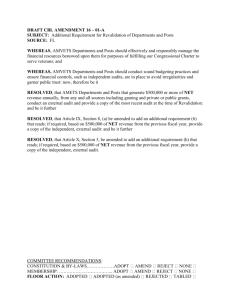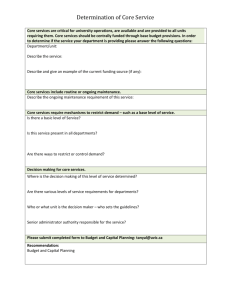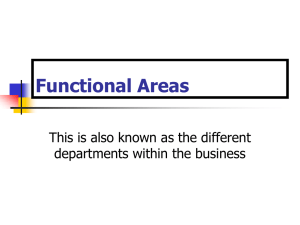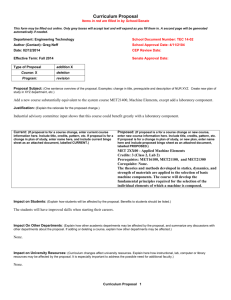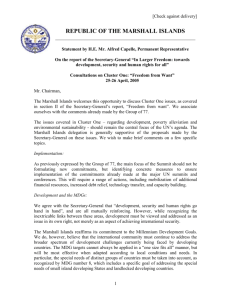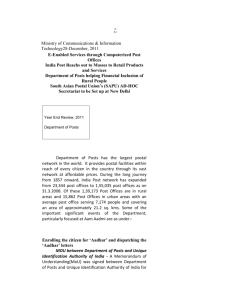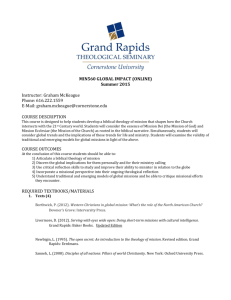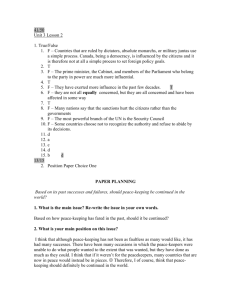UNITED - the United Nations
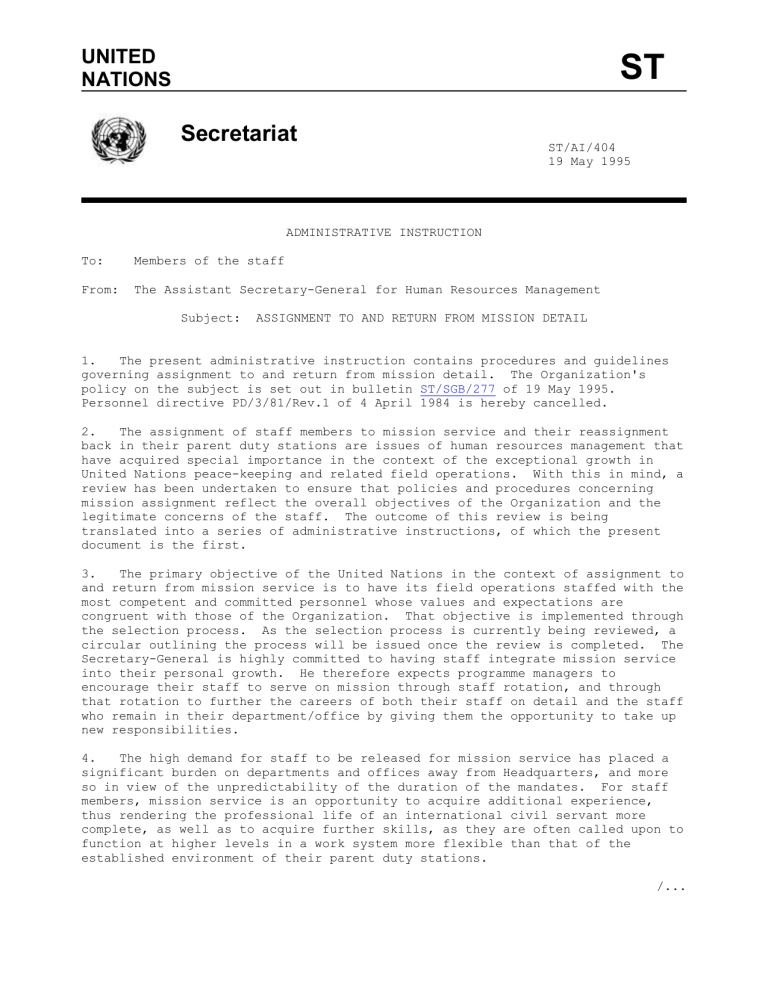
UNITED
NATIONS
ST
Secretariat
ST
ST/AI/404
To: Members of the staff
ADMINISTRATIVE INSTRUCTION
19 May 1995
From: The Assistant Secretary-General for Human Resources Management
Subject: ASSIGNMENT TO AND RETURN FROM MISSION DETAIL
1. The present administrative instruction contains procedures and guidelines governing assignment to and return from mission detail. The Organization's policy on the subject is set out in bulletin ST/SGB/277 of 19 May 1995.
Personnel directive PD/3/81/Rev.1 of 4 April 1984 is hereby cancelled.
2. The assignment of staff members to mission service and their reassignment back in their parent duty stations are issues of human resources management that have acquired special importance in the context of the exceptional growth in
United Nations peace-keeping and related field operations. With this in mind, a review has been undertaken to ensure that policies and procedures concerning mission assignment reflect the overall objectives of the Organization and the legitimate concerns of the staff. The outcome of this review is being translated into a series of administrative instructions, of which the present document is the first.
3. The primary objective of the United Nations in the context of assignment to and return from mission service is to have its field operations staffed with the most competent and committed personnel whose values and expectations are congruent with those of the Organization. That objective is implemented through the selection process. As the selection process is currently being reviewed, a circular outlining the process will be issued once the review is completed. The
Secretary-General is highly committed to having staff integrate mission service into their personal growth. He therefore expects programme managers to encourage their staff to serve on mission through staff rotation, and through that rotation to further the careers of both their staff on detail and the staff who remain in their department/office by giving them the opportunity to take up new responsibilities.
4. The high demand for staff to be released for mission service has placed a significant burden on departments and offices away from Headquarters, and more so in view of the unpredictability of the duration of the mandates. For staff members, mission service is an opportunity to acquire additional experience, thus rendering the professional life of an international civil servant more complete, as well as to acquire further skills, as they are often called upon to function at higher levels in a work system more flexible than that of the established environment of their parent duty stations.
/...
ST/AI/404
Page 2
5. It is in this context that modifications to the existing policy of mission detail are addressed in the present administrative instruction in terms of:
(a) Assignment to and blocking of posts of staff members on mission detail;
(b) Mission replacement;
(c) Training and preparing staff for mission assignment;
(d) Debriefing and reintegration of staff returning from mission service.
6. It should be emphasized that mission detail, as any other assignment in the
Organization, is at the discretion of the Secretary-General, as provided in staff regulation 1.2
, which states: "Staff members are subject to the authority of the Secretary-General and to assignment by him to any of the activities or offices of the United Nations." In this respect, all internationally recruited staff members can be assigned to missions as deemed necessary by the Secretary-
General. At the same time, without prejudice to this tenet, voluntary service on mission is encouraged and preferred. The Organization's policy is thus to invite qualified candidates to volunteer for mission service, and to encourage parent departments/offices to release such qualified staff subject to the guidelines detailed in paragraphs 7 to 9 below. Selection for mission service is made in the light of the needs of the mission concerned, with due regard to performance, potential, necessary skills and suitable experience. Selection is not an entitlement in any sense or form.
7. Consistent with the intent of paragraph 6 above, it is most important that staff in the Professional and General Service and related categories proceeding on mission detail be assured that they can return to their current post.
Accordingly, for a period of up to two years, in conjunction with a staff member's mission assignment, releasing departments/offices are responsible for ensuring that the posts of detailed staff members holding permanent or long-term appointments are blocked. These posts are to be filled only through temporary recruitment of replacement staff, if necessary, or through temporary staff redeployment (including a special post allowance, when called for). If it is proposed that the mission detail be extended beyond two years, it will not be possible to grant any extension unless there is a specific written agreement to continue blocking the post in the parent department. The implementation of this agreement will be monitored by the Office of Human Resources Management.
8. Staff whose fixed-term appointment will expire during the period of detail may be extended until the expected end of the detail, but mission service does not of itself create an expectancy of renewal. Staff on fixed-term appointment who wish to go on mission should discuss the matter of their return with the releasing department, which will determine in writing whether it can undertake to reabsorb them depending on the needs of the service.
/…
ST/AI/404
Page 3
9. The demand for qualified staff to serve on field missions has placed a significant burden on departments and on the staff who remain, who must continue to maintain and even enhance productivity in programme delivery. It is for this reason that departments cannot be expected to block posts for more than two years when permanent staff members proceed on mission detail. Every effort will be made to balance their needs with those of the special mission and of the
Organization as a whole. With this in mind, in order to begin building a system of mission rotation that will meet the needs of both programme managers and the staff, it has been decided to set an 8 to 10 per cent ceiling as a guideline in determining the percentage of staff that a department or office is expected to release for mission service. Within that ceiling programme managers are expected to ensure equitable opportunities for the release of their staff for mission service. Once a department/office has reached this ceiling, the department/office would not be expected to release additional staff until a corresponding number of staff have returned. This will serve to facilitate the release of staff for both long-term and short-term assignments and will, in turn, give more staff an opportunity to benefit systematically from the assignment. It would also ensure that programme managers will continue to have committed and competent staff carrying out the programmes that have been entrusted to them.
10. The Office of Human Resources Management and the Department of Peacekeeping Operations are developing an intensive training programme for staff undertaking core administrative functions in field missions. This programme includes two weeks of classroom instruction on United Nations peace-keeping operations and areas of specialization, followed by two and a half months of onthe-job training.
11. In order better to prepare staff and, when appropriate, their families for mission service, counselling sessions dealing with stress management are also being developed. Lessons learned from the present pilot training programme and the further development of relevant counselling sessions will serve as a basis for the issuance of an administrative instruction on the subject of training and counselling for mission service.
12. Debriefing procedures in situ are also an important tool that can assist in both planning for future missions and the reintegration of staff members to life and work at the parent duty station. Such procedures will be established as soon as possible, and will be communicated in an administrative instruction on the subject of debriefing of staff returning from mission detail.
-----
